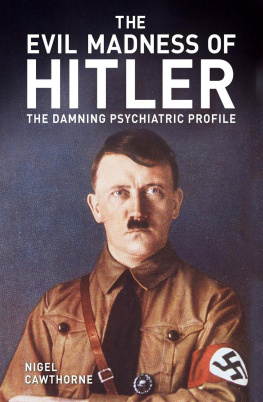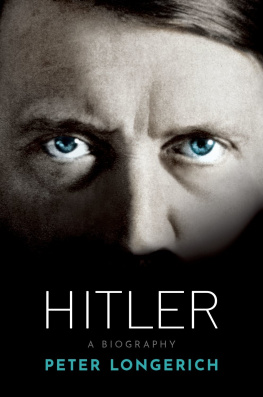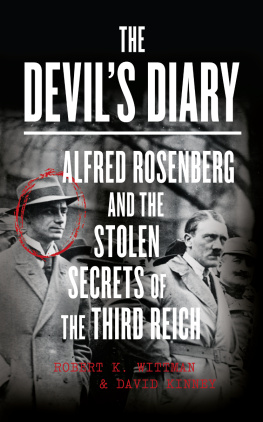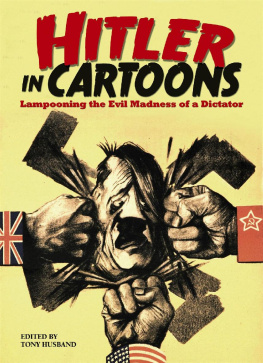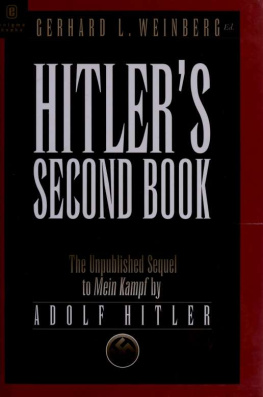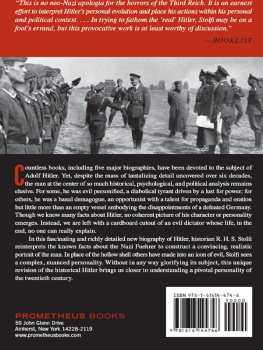Revell - HITLER: A Biography of Evil: The Life and Times of the Most Evil Man in History, Adolf Hitler
Here you can read online Revell - HITLER: A Biography of Evil: The Life and Times of the Most Evil Man in History, Adolf Hitler full text of the book (entire story) in english for free. Download pdf and epub, get meaning, cover and reviews about this ebook. year: 2017, genre: Non-fiction. Description of the work, (preface) as well as reviews are available. Best literature library LitArk.com created for fans of good reading and offers a wide selection of genres:
Romance novel
Science fiction
Adventure
Detective
Science
History
Home and family
Prose
Art
Politics
Computer
Non-fiction
Religion
Business
Children
Humor
Choose a favorite category and find really read worthwhile books. Enjoy immersion in the world of imagination, feel the emotions of the characters or learn something new for yourself, make an fascinating discovery.

- Book:HITLER: A Biography of Evil: The Life and Times of the Most Evil Man in History, Adolf Hitler
- Author:
- Genre:
- Year:2017
- Rating:3 / 5
- Favourites:Add to favourites
- Your mark:
- 60
- 1
- 2
- 3
- 4
- 5
HITLER: A Biography of Evil: The Life and Times of the Most Evil Man in History, Adolf Hitler: summary, description and annotation
We offer to read an annotation, description, summary or preface (depends on what the author of the book "HITLER: A Biography of Evil: The Life and Times of the Most Evil Man in History, Adolf Hitler" wrote himself). If you haven't found the necessary information about the book — write in the comments, we will try to find it.
Revell: author's other books
Who wrote HITLER: A Biography of Evil: The Life and Times of the Most Evil Man in History, Adolf Hitler? Find out the surname, the name of the author of the book and a list of all author's works by series.
HITLER: A Biography of Evil: The Life and Times of the Most Evil Man in History, Adolf Hitler — read online for free the complete book (whole text) full work
Below is the text of the book, divided by pages. System saving the place of the last page read, allows you to conveniently read the book "HITLER: A Biography of Evil: The Life and Times of the Most Evil Man in History, Adolf Hitler" online for free, without having to search again every time where you left off. Put a bookmark, and you can go to the page where you finished reading at any time.
Font size:
Interval:
Bookmark:
HITLER
A Biography of Evil
The Life and Times of the Most Evil Man in History, Adolf Hitler
Anna Revell
Copyright 2017.
All rights reserved. No part of this publication may be reproduced, distributed, or transmitted in any form or by any means, including photocopying, recording, or other electronic or mechanical methods, without the prior written permission of the publisher, except in the case of brief quotations embodied in critical reviews and certain other noncommercial uses permitted by copyright law.
This book is intended for informational and entertainment purposes only. The publisher limits all liability arising from this work to the fullest extent of the law.
The rejected artist
In 1908 a young man left the Academy of Fine Arts in Vienna. The 19 year old youth was bitterly disappointed. He had sought a place in that august institution, and had been rejected for the second time.
The young man's name was Adolf Hitler. He was the son of a customs official, Alois Hitler, a harsh, overbearing figure who beat him and with whom Adolf constantly fought. Alois died in 1903.
Klara, Adolf's mother, was by contrast a kind and affectionate woman. When she died of breast cancer in 1908 he was inconsolable, having lost probably the only meaningful relationship in his life.
Adolf left school in 1905 with dreams of being a painter. But the Academy had dismissed his application, citing his 'unfitness for painting.'
Despondent and penniless, Adolf eked a meagre living painting watercolours in Vienna, often relying on soup kitchens vagrant shelters.
His paintings have been described as competent, but certainly not outstanding. Hitler maintained his interest in art throughout his life. He painted in quiet moments during World War I
In later years he would see art purely as an expression of the political will.
Life in Vienna was hard. Without money and prospects, the young Hitler lived on charity and luck. His dreams were dashed and he had nothing to hope for.
Vienna at this time was the capital of the Austro-Hungarian Empire. Austria and Hungary, united under Franz Joseph I of the ancient House of Habsburg, together ruled a hotchpotch of ethnicities: Germans, Magyars, Romanians, Poles, Slavs, Czechs, Slovaks, Slovenians, Italians and Romanians.
Hungary was dominated by the Magyars, and in Austria the Germans ruled.
To the north of Austria was the great German Empire or Reich . In 1871 the powerful Kingdom of Prussia, ruled by the Hohenzollern dynasty, had united all of Germany.
All Germany that is, except for Austria which remained under Habsburg rule. The German nationalist movement, which baulked at having been excluded from the German Reich, was growing in Vienna at the time Hitler was on its streets.
The most prominent advocate of union with Germany was George Ritter Schonerer.
A gifted and fiery orator, Schonerer (1842 - 1921) was elected to Austria's parliament, the Imperial Council, and denounced the anti-German, Catholic Habsburg regime.
Schonerer went on to form his own party, the Pan-German party. His vision for a greater Germany did not include the Jews. He maintained that a Jew could not be a good German.
Schonerer was certainly not alone in his contempt for the Jews. Anti-Semitism figured in the writings of many European intellectuals during the nineteenth century.
A French Jew, Alfred Dreyfus, was accused of leaking military secrets in the 1890s. The Czars of Russia periodically and systematically persecuted Russian Jews.
A forged document, entitled The Protocols of the Elders of Zion was published in 1903. It purports to set forth a plan for the subversion of Christian Europe to Jewish control. It was read widely and continues to circulate today.
In this environment Schonerers ideas and personality gripped many young minds in Austria. Hitler's was one of them.
Hitler, disillusioned and aimless, had at last an idea that could inspire him. He wrote in his memoir, Mein Kampf, 'I ceased to be a weak-kneed cosmopolitan and became an anti-Semite at this time of bitter struggle; the streets of Vienna had provided valuable instruction.'
In 1914 the black clouds of war were hanging over Europe. A number of diplomatic crises had brought the Great Powers Austria-Hungary, France, Germany, Great Britain and France - to the brink of war.
On these occasions these countries had pulled back from the edge just in time. Yet there was the feeling that conflict was inevitable. Nations sharpened their swords and called their youth to the colors.
Adolf Hitler was ordered to attend an army conscription station to be examined. He was declared physically unfit for service. Perhaps reeling from the blow, Hitler left the Austro-Hungarian Empire for his fathers estate in Munich, Bavaria.
The soldier
On June 28 1914 an Austro-Hungarian archduke who happened to be heir to the imperial throne, Franz Ferdinand, was shot and killed, along with his wife, by Serbian nationalists in the town of Sarajevo in Bosnia-Herzegovina.
A short period of frantic diplomatic exchanges began, followed by mobilization of troops by the Great Powers. Austria-Hungary declared war on Serbia on July 28. Declarations of war cascaded one after another, and by August 4 all the Great Powers were at war.
Austria-Hungary and the German Empire were allied against France, Great Britain and Russia. The moribund Turkish Empire and Bulgaria later joined the former. The United States, Italy, Romania and Greece would join the latter.
The youth of Europe joined the colors with a joyous abandonment that seems incomprehensible to us today. The young Hitler, living in Munich, was likewise fired with zeal for Germanys cause, and sought to enlist in the Bavarian Army.
Hitler was still an Austrian citizen but he was allowed to enlist. Bavarian officials were later to question how a non-German citizen could join the imperial German forces.
The 25 year old Hitler was assigned to the 16 th Bavarian Reserve Regiment. He saw action in Belgium at the First Battle of Ypres in October 1914.
During this battle almost a half of the newly recruited German troops perished. Hitlers own regiment lost five sixths of its men, including the commander.
Afterwards Private Hitler was made a corporal and regimental message runner on the Western Front. In this capacity he often found time to paint and read politics.
As a messenger Hitler was privy to military planning, discussions, orders and intelligence. This was considered by many to be a cushy job, since it took its incumbent away from the combat zone.
Hitlers soldier friends regarded him as an individual who liked to keep to himself. He never complained and never talked about women. He never drank and hardly wrote letters home. He had a most unmilitary bearing, and, although brave, seemed to have a knack for avoiding injury.
In later years Hitler would make a great deal of his war experiences, lauding himself to his generals and party colleagues, especially when they were trying to tell him that his military strategies would not work.
Hitler was not an outstanding soldier, despite being awarded five medals, including the Iron Cross First Class in 1918. His officers would not recommend him for promotion to sergeant, believing him to lack the leadership qualities required.
His Iron Cross, which Hitler would wear with pride all his life, was awarded for service as a messenger.
Historians have questioned whether this medal, hardly ever awarded to someone of Hitlers rank, was truly merited. After all, taking messages from HQ to the front lines was his job, and the citation does not mention any specific incident that might have merited it.
It has been suggested that the awarding of the Iron Cross was a mistake. Whatever the circumstances, it seemed to seal Hitlers later belief that he was a war hero, and the man best suited to lead Germany into war.
Next pageFont size:
Interval:
Bookmark:
Similar books «HITLER: A Biography of Evil: The Life and Times of the Most Evil Man in History, Adolf Hitler»
Look at similar books to HITLER: A Biography of Evil: The Life and Times of the Most Evil Man in History, Adolf Hitler. We have selected literature similar in name and meaning in the hope of providing readers with more options to find new, interesting, not yet read works.
Discussion, reviews of the book HITLER: A Biography of Evil: The Life and Times of the Most Evil Man in History, Adolf Hitler and just readers' own opinions. Leave your comments, write what you think about the work, its meaning or the main characters. Specify what exactly you liked and what you didn't like, and why you think so.


